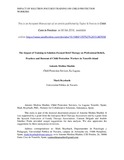Mostrar el registro sencillo del ítem
The impact of training in solution-focused brief therapy on professional beliefs, practices and burnout of child protection workers in Tenerife island
| dc.creator | Medina Machín, Antonio | es_ES |
| dc.creator | Beyebach, Mark | es_ES |
| dc.date.accessioned | 2018-03-14T12:38:23Z | |
| dc.date.available | 2018-03-14T12:38:23Z | |
| dc.date.issued | 2014 | |
| dc.identifier.issn | 1357-5279 (Print) | |
| dc.identifier.issn | 1476-489X (Electronic) | |
| dc.identifier.uri | https://hdl.handle.net/2454/27942 | |
| dc.description.abstract | This paper presents the first results of a large-scale research project on the child protection services in Tenerife, Spain. In Study 1, the professional beliefs and practices of 152 child protection workers, as measured by a Professional Beliefs and Practices Questionnaire (Medina & Beyebach, 2010), were correlated with their scores on the Maslach Burnout Inventory (Maslach, Jackson, & Leiter, 1996). Higher scores in a variety of deficit-based beliefs and practices were associated with higher burnout scores, while strengths-based beliefs and practices correlated negatively with burnout. In Study 2, the workers were assigned either to a control group, or to an experimental group that received 30 hours of training in solution-focused brief therapy (SFBT) plus 30 hours of supervision. Workers in the experimental group changed their professional practices and beliefs in a more strengths-based direction from pre-test to 6-month follow-up, with large effect sizes for the SFBT training (from d=1.42 to d=2.07). The SFBT training also had a small but significant effect on burnout at follow-up (d= .48). A regression model was able to account for 83. 8% of the variance in burnout scores at 6-month follow-up. Neither time working in child protection nor severity of cases predicted burnout at follow-up. Burnout at follow-up was predicted by burnout at pre-test and by changes in the professional beliefs and practices of workers. Workers who changed in the direction of more strengths-based beliefs showed lower burnout scores at follow-up, whereas those who changed to more deficit-based beliefs increased their burnout. Workers who changed their professional practices in the direction of focusing more on the difficulties of service users showed increased burnout. Changing practice in the direction of becoming more collaborative, “leading families from one step behind”, and of working in a more trans-disciplinary way with team members and other colleagues predicted lower burnout. | en |
| dc.format.mimetype | application/pdf | en |
| dc.language.iso | eng | en |
| dc.publisher | Taylor & Francis | en |
| dc.relation.ispartof | Child Care in Practice, 2014, Vol. 20, No 1, pp. 7-36 | en |
| dc.rights | © 2014 The Child Care in Practice Group | en |
| dc.subject | Solution-focused brief therapy | en |
| dc.subject | Child protection | en |
| dc.subject | Burnout | en |
| dc.subject | Professional beliefs | en |
| dc.subject | Professional practice | en |
| dc.title | The impact of training in solution-focused brief therapy on professional beliefs, practices and burnout of child protection workers in Tenerife island | en |
| dc.type | Artículo / Artikulua | es |
| dc.type | info:eu-repo/semantics/article | en |
| dc.contributor.department | Psicología y Pedagogía | es_ES |
| dc.contributor.department | Psikologia eta Pedagogia | eu |
| dc.rights.accessRights | Acceso abierto / Sarbide irekia | es |
| dc.rights.accessRights | info:eu-repo/semantics/openAccess | en |
| dc.identifier.doi | 10.1080/13575279.2013.847058 | |
| dc.relation.publisherversion | https://doi.org/10.1080/13575279.2013.847058 | |
| dc.type.version | Versión aceptada / Onetsi den bertsioa | es |
| dc.type.version | info:eu-repo/semantics/acceptedVersion | en |


